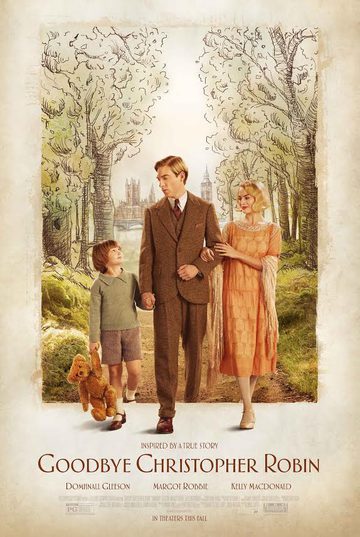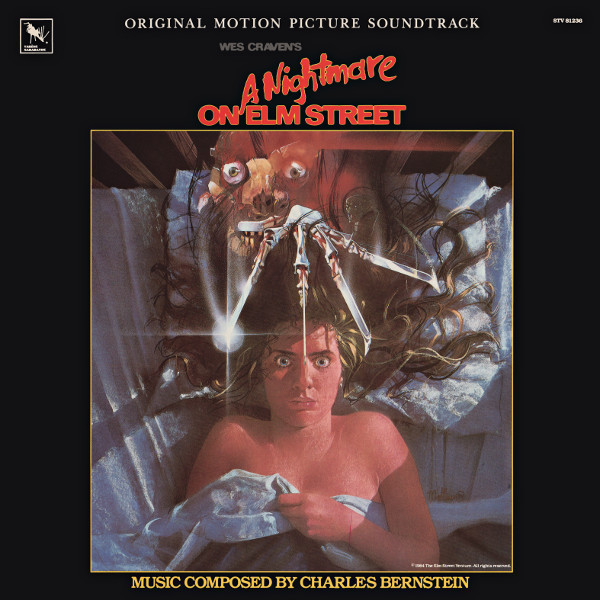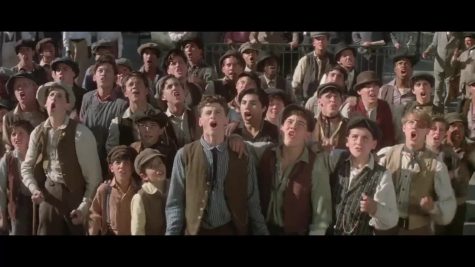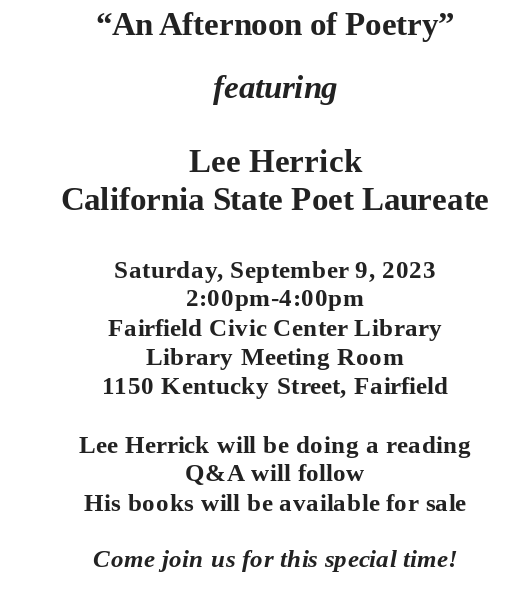Saying goodbye to our childhood: Goodbye Christopher Robin

A tearful goodbye to our childhood with Winnie the Pooh.
Four years ago, in September 2017, Jazz Tangcay wrote a review for www.awardsdaily.com of the film Goodbye Christopher Robin, a story about the inspiration for the loveable stories about Winnie the Pooh. Have you seen the movie? Did you agree with this review? Share your response in the comments below.
He steals honey and he’s the most beloved bear in the world. Created by A.A Milne, Winnie the Pooh and his adventures with Tigger, Piglet and Roo have charmed generations of children in a beloved series of tales whose illustrations came to adorable life on screen with a touch of Disney magic.
In Goodbye Christopher Robin, director Simon Curtis takes us into Milne’s life and relates how his son, Christopher Robin “Billy Moon” was instrumental in inspiring the classic stories. There are moments as lovely as one would expect, but make no mistake, this film is not all sugar and sweet.
The film opens with Carter Burwell’s delicate and enchanting score in the familiar forest that would serve as the inspiration for Pooh’s Hundred Acre Wood. But even a setting as idyllic as this could not escape the storms of war. We’re introduced to author A.A Milne (Domhnall Gleeson) who has returned from World War I a changed man. Before the war, Milne had been a clever writer of light humor for Punch. Now, having witnessed the horrors of war, he wants to focus on writing about that. However, the slightest sound of a cork popping or the brightest light triggers memories of the battlefield and dealing with the trauma remains a constant struggle. The experience haunts him and always will.
Margot Robbie delivers a sparkling performance as his wife Daphne, a lady of abundant wit and allure, well-suited to a glitzy life in high society London. Accustomed to partying at soirées but perhaps ill-prepared to cope with much else, she epitomizes the 1920s upper class, fetchingly attired in flapper fringe, pearls and fur. Unwilling to address her husband’s PTSD, a condition barely understood in those days, she resists his fixation on “frightful things.” Her advice to get past it is simple: “the great thing is to find something to be happy about and stick to that.”
Their choppy passage to seek safe harbor finds a tenuous mooring with childbirth and the arrival of their son Christopher Robin, nicknamed Billy Moon. When the young parents struggle to connect with this new addition, they hire a nanny called Olive to help care for him, as was commonplace in those days among families with means. Kelly MacDonald is essentially the boy’s Mary Poppins, whose attentive pragmatism becomes a stabilizing force in his life.
Frustrated with their circle of friends in the city where so much now feels frivolous to him, Milne moves the family to the English countryside with the intention of writing serious essays and somber fiction. He wants his work to convey the horror of war, maintaining hope that writing about the brutality of World War I will sound a warning for humanity to never go that route again. But of course history’s arc and personal detours refuse to play out quite the way he wishes.
Isolated from the only life she has ever known, Daphne is bored in rural Sussex, a far cry from the high society swirl of London, and when Milne’s reason for seclusion fails to materialize — his writing is fruitless — she packs up and moves back to London. Before she leaves his mother gives Billy Moon a set of toys that will prove to be immensely important: a tiger, a piglet, and a kangaroo.
A family emergency for Olive forces Milne and Moon to spend all their time together, unfiltered. Early awkward moments between father and son soon give way to tender bonding and it’s here that Curtis shows us the origins of the iconic illustrated adventures of the classic Pooh stories. Fond walks in the woods, a fascinating trip to London Zoo, and fantastical whims of their shared imagination help spark the inspiration for Milne to write about Christopher Robin and his hapless bear buddy named Pooh. The camerawork is magical in these sequences, as the warm amber hues of sunlight radiate through the leafy canopy of the woods, and a honey-toned realm conducive to a bear who can talk comes alive.
It’s 1923 and Milne’s Vespers are published in Vanity Fair catapulting Christopher Robin into the limelight. It’s not long before his parents are urging him on, swiftly parading him to book signings, photocalls, scheduling interviews, thrusting him in front of the adoring press and fans who idolize him. Eager to please his parents, the boy obliges every stunt, even when he is made to pose alongside Winnie, a real-life black bear at London Zoo. It’s up to Nanny Olive to raise concerns about risks of the boy’s exploitation while his parents seem blindingly oblivious to their behavior. We share Olive’s reservations as we watch a young boy who craves nothing more than his parent’s attention while they bask in their newfound acclaim.
Will Tilston is the newcomer who plays the young Christopher Robin. He is undeniably cute with a blond bowl haircut and sweet smile to melt the hardest heart. One of his standout scenes occurs when Olive prepares to leave for the evening on a date and all his pent-up fears about parental abandonment burst out in a fit of fury and desperate neediness. Nanny has always been there for him and now he must accept that she too will one day leave.
Alex Lawther plays teen Christopher Robin, a young man sent off to boarding school who later enlists to fight in World War II. In his short amount of screen time, he unleashes a torrent of resentment toward the unwanted fame that the fictional Christopher Robin had brought him, and starkly emphasizes how severely that character had invaded and warped his childhood.
Gleeson and Robbie are excellent as the troubled parents, capturing the essence of souls cast adrift between the wars — an upper-class socialite and a traumatized war veteran, both too overwhelmed by the upheavals of their shattered youth and damaged adulthood to properly care for a child. The Vespers and other books Milne wrote were tools for his own escape, representing the only time he was truly happy, witnessing the world through his young son’s eyes, giving himself over to the fantasy and magic of the hundred acre wood. That was little solace for the boy himself.
Carter Burwell’s fine score is beautiful and enchanting throughout. His harp strings and orchestrations are a perpetual gift to cinema and in this film his score stirs a warm sensation of cozy nostalgia. Ben Smithard’s cinematography frames the warmth of the beautiful forest ensuring that those walks will offer up numerous “ah-ha” moments of details we recall from the books.
Simon Curtis doesn’t shy away from reminding us of the horrors of war, and by leading us on this journey with the real Christopher Robin he helps us see how the aftershocks of that devastation reverberated across generations. He captures all the inherent magic of the Hundred Acre Woods while reminding us that the brief enchantment it provided for Milne and his son would come at great cost. Goodbye Christopher Robin provides fine entertainment as we learn how the story of a boy and his bear came to be, and it makes us appreciate the price that was paid by one special child for the joy he brought to millions of others worldwide.








